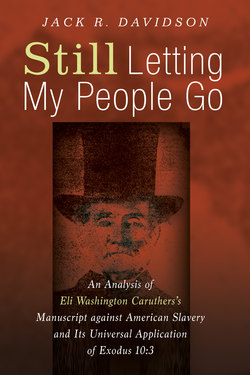Читать книгу Still Letting My People Go - Jack R. Davidson - Страница 4
На сайте Литреса книга снята с продажи.
Abstract
ОглавлениеWithin the theological and historical context of nineteenth-century America, Eli Washington Caruthers’s unpublished manuscript, American Slavery and the Immediate Duty of Southern Slaveholders, is an authentic alternative to the nineteenth-century hermeneutics that supported slavery. On the basis of Exodus 10:3—“Let my people go that they may serve me,” Caruthers argues that God was acting in history against all slavery. Unlike proslavery or antislavery arguments guided largely by the New Testament, Caruthers believes the Exodus text is a privileged passage to which all thinking on slavery must conform. Permeation of nineteenth-century antislavery literature with the Exodus text gave divine impetus to the struggle against slavery and a genuine social dimension to the Christian faith. As the most extensive development of the Exodus text within this field of literature, Caruthers’s manuscript is an invaluable primary source, especially relevant to historians’ current appraisal of the biblical sanction for slavery in nineteenth-century America. It does not correspond to characterizations of antislavery literature as biblically weak. For example, historians Elizabeth Fox-Genovese and Eugene Genovese assert that the proslavery argument is based upon scripture and the antislavery argument is less biblical, dependent on the ideals of the Enlightenment. To the contrary, the analysis of Caruthers’s manuscript reveals a thoroughly reasoned biblical argument unlike any other produced during the nineteenth century against the hermeneutics supporting slavery.
